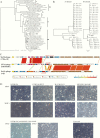Escherichia coli O8:H8 Carrying a Novel Variant of the Heat-Labile Enterotoxin LT2 Gene Caused Outbreaks of Diarrhea
- PMID: 32016129
- PMCID: PMC6988837
- DOI: 10.1093/ofid/ofaa021
Escherichia coli O8:H8 Carrying a Novel Variant of the Heat-Labile Enterotoxin LT2 Gene Caused Outbreaks of Diarrhea
Abstract
No outbreaks caused by Escherichia coli-producing heat-labile enterotoxin LT2 have been reported to date. Here, we revealed that the E. coli O8:H8 strains isolated from patients in 2 independent diarrhea outbreaks were negative for any known virulence determinants in routine microbiological tests, were very closely related, and carried a prophage-encoded gene for a novel LT2 variant (LT2d) and the genes for colonization factor antigen III. We also showed that LT2d has a cytotonic activity similar to LT1. These data indicate the importance of E. coli strains producing LT2d as a human pathogen.
Keywords: colonization factor antigen; diarrhea outbreak; heat-labile enterotoxin; phage; scherichia coli.
© The Author(s) 2020. Published by Oxford University Press on behalf of Infectious Diseases Society of America.
Figures

References
-
- von Mentzer A, Connor TR, Wieler LH, et al. . Identification of enterotoxigenic Escherichia coli (ETEC) clades with long-term global distribution. Nat Genet 2014; 46:1321–6. - PubMed

